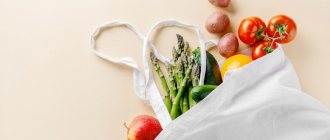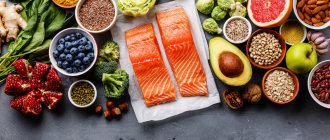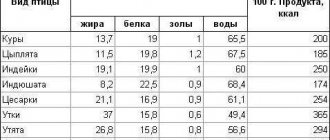Carbohydrates are unfairly blamed for all the troubles of people who are trying to lose weight. The problem is that today you can read about the dangers of almost any product and drown in a sea of false information without ever getting to the bottom of it. But you can't fool science. There is no evidence that carbohydrates are harmful for weight loss. In this article I will tell you whether you should be afraid of carbohydrates or whether you need to make friends with them, how they affect weight loss, how many carbohydrates you should consume and from what products. You'll understand what a healthy weight loss approach looks like and dispel a few nutrition myths in your head.
What are carbohydrates in food
Carbohydrates are macronutrients in food, just like proteins and fats.
The breakdown product of carbohydrates in our body is monosaccharides (glucose, fructose and others). Or rather, even so - any carbohydrate from food will break down in our body to glucose, fructose and other simple carbohydrates included in its composition - like sugar, like whole grain bread, and the oxidation of 1 g of carbohydrates will release 4 kcal of energy (but more on that later). The body doesn't care where we got this or that carbohydrate from.
Table 1. Classification of carbohydrates
| Monosaccharides | Disaccharides | Polysaccharides |
| Glucose and fructose | Sucrose, maltose, lactose | Starch, fiber, cellulose, chitin, glycogen |
| They consist of one molecule, so they are quickly absorbed. | They consist of two molecules of monosaccharides and require a longer time to digest and assimilate compared to monosaccharides. | They consist of tens, hundreds, thousands of monosaccharides. They take a long time to digest and absorb, unlike simple carbohydrates. Contains many nutrients (proteins, vitamins and minerals). |
This is the most accessible source of energy from food for our body. That is, it is easier for the body to use energy from carbohydrates than from fats and proteins. However, this does not mean that the body does not burn fats and proteins for its needs, it is just that carbohydrates are used first when performing any work.
Carbohydrates in our body are stored as glycogen in the muscles and liver. Glycogen in muscles (it contains 1-3% of the total weight of muscles) ensures their motor activity, liver glycogen (its content is approximately 100-120 g) serves to maintain the functioning of body systems. In total, approximately 350-500 g of glycogen can be accumulated in the body of an adult, or, if converted into calories, 1400-2000 kcal, which the body uses to support itself and perform physical work - breathing, maintaining normal blood sugar levels, brain function, walking , hand movements, doing exercises, etc.
Each gram of glycogen in the muscles holds an additional 3-4 g of water. When glycogen stores are replenished, muscles appear full. This also explains the quick results of low-carb diets. By severely limiting your carbohydrate intake, you actually get rid of water, reducing your weight significantly. However, the body will still equalize the water content in the body and the weight may even increase compared to the original if you do not maintain a calorie deficit. Read about the effect of water balance on body weight and what calorie deficit is needed to lose weight.
How many carbohydrates should you eat?
How many carbohydrates to consume depends on your nutrition plan, training style and frequency, and many other factors. Personally, I would not recommend consuming more than 50-180 grams per day (about 1.5-2 g per kilogram of weight in different cutting phases).
Consumption of fast carbohydrates is necessary, but you should not consume them too much. I would not recommend more than 30% of your total intake, the remaining 70% should be slow carbohydrates. In addition, each meal (at least fast carbohydrates) should be combined with 1-2 grams of L-carnitine, which will allow the consumed carbohydrates to go into glycogen stores in the muscles and liver, and not into fat deposits.
Are carbohydrates good or bad for weight loss?
Carbohydrates are neither good nor bad for weight loss. To be healthy, you must have them on a diet. What is important for losing weight is a calorie deficit. If you get less energy from food than your body spends per day, you will lose weight. Read a detailed article about energy balance, where I talk about how this principle works in life.
There is no need to exclude carbohydrates from your diet; you need to monitor the caloric content of your diet (read how to count calories correctly).
It is generally dangerous to cut carbohydrates to zero in the long term, since they, in addition to energy, have protective, regulatory and construction functions.
What does the body spend calories on?
One girl was interested in whether it is possible to eat, for example, 2500 kcal per day, if within the framework of proper nutrition and BJU balance? To answer this question, let's first figure out what the body spends calories on. In fact, everything is very simple. Each person has his own personal basal metabolism - this is the amount of energy (calories) that your body spends to maintain normal life functions, being at complete rest (without movement, with a calm emotional background and room temperature). This value depends on genetics, weight, age, amount of muscle mass, and physiological characteristics. In addition to basic metabolism, you also spend energy doing any activity during the day: walking, cleaning, training, work, stress (yes, even when you’re nervous, you spend calories). The sum of these two terms yields the total number of calories you burn per day.
How many carbohydrates do women and men need per day when losing weight?
The amount of required carbohydrates on a diet for men and women is calculated on a residual basis. First of all, proteins are calculated, then fats, then carbohydrates. The order is:
- We determine the amount of protein on a diet from this article.
- We give 30-35% of the caloric content of the diet to fats, but not less than 1 g per 1 kg of current weight for girls.
- All remaining calories will be covered by carbohydrates.
Let's use examples. A woman weighing 75 kg wants to lose weight to 65 kg and found out that to do this she needs to consume no more than 1600 kcal (how to determine how many calories you need to consume per day to lose weight). She also found that she needed 1.8 grams of protein. We multiply 1.8 by the desired weight (I wrote here why you need to calculate protein by the desired weight):
1.8 x 65 = 117 g of protein or 117 x 4 = 468 calories from protein, where 4 is the calorie content of 1 g of protein.
Next we count fats:
1600 x 0.35 = 560 kcal or 560/9 = 62 g of fat, where 9 is the calorie content of 1 g of fat.
But it’s better for girls not to go below the level of 1 g of fat per 1 kg of weight, so we take 75 g of fat or 675 calories as the norm.
And finally, we count carbohydrates using the residual principle:
1600 – 468 – 675 = 457 kcal or 457/4 = 114 g of carbohydrates, where 4 is the calorie content of 1 g of carbohydrates.
100 g of carbohydrates is the minimum amount , or rather 100 g of glucose is needed by the brain daily for normal functioning [1]. Therefore, do not go below this figure.
This plan is a healthy approach to dieting that will allow you to lose weight, maintain muscle, and feel good throughout your weight loss journey. Read how to calculate the duration of a diet.
Calculation of the amount of carbohydrates per day
The recommendations are the same for men and women: 45-65% of the daily calorie intake or 3-5 g per 1 kg of body weight.
If we talk about the quantitative norm of carbohydrate consumption, then with a high fiber content for women, their amount should be 50-300 g per day.
The exact figure depends on your level of physical activity, carbohydrate tolerance, and the goals you set for yourself. If you want to lose weight, then reduce the amount of carbohydrates, if on the contrary, then increase it.
Which carbohydrates should you focus on, especially when losing weight?
If the average carbohydrate intake is 300 grams per day, then distribute them this way:
- complex carbohydrates - 210 g;
- fiber - 40 g;
- fructose - 25 g;
- sucrose - 25 g (WHO recommends no more than 10% of all carbohydrates, ideally no more than 5%).
But don’t be alarmed by the calculations; technological progress has made the task of managing our diet much easier. Download a mobile app to count calories and you will make your life much easier.
Use a few calculation tips:
- Be sure to buy a kitchen scale.
Without them, carbohydrate calculations will be inaccurate, which means it will be more difficult to achieve the desired weight loss result.
- Weigh only uncooked foods.
For example, the energy value of 100 g of dry cereal and 100 g of cooked product is not the same.
- Weigh food that is ready to eat or cook
: boneless meat, fruits and vegetables without peel and core.
- Plan your sample menu in advance
for tomorrow, knowing your individual calorie and carbohydrate intake.
Always leave a small corridor (150-200 kcal) to have space for an unplanned snack or you decide to replace one product with another.
- If you are preparing a complex dish consisting of several ingredients (soup, casserole, stew), before cooking weigh each ingredient
, calculate their energy value and summarize the resulting numbers.
Let's look at a specific example of how to correctly count calories and carbohydrates.
Let's calculate KBJU for quinoa
:
- Weigh the required amount of dry quinoa.
For example, you got 70 g.
- We look at the KBZHU data on the packaging or on the Internet per 100 g:
Calories: 380 kcal.
Proteins: 14 g.
Fat: 7 g.
Carbohydrates: 65 g.
- Since we do not plan to eat 100 g, we calculate 70 g per serving, multiplying all indicators by 0.7:
KBJU quinoa - 70 g.
Calories: 380*0.7 = 266 kcal.
Proteins: 14*0.7 = 9.8 g.
Fats: 7*0.7 = 4.9 g.
Carbohydrates: 65*0.7 = 45.5 g.
This is the ultimate quinoa KBJU for 70 g
: calories – 266 kcal; proteins - 9.8 g, fats - 4.9 g, carbohydrates - 45.5 g
No matter how much water you add, how much your quinoa is cooked, and no matter how much it weighs after cooking, you are entering data into your food journal based on dry matter.
Thus, a serving of quinoa will take up 45.5 grams of total carbohydrates for the day. Using the same principle, you can calculate the remaining carbohydrates in your diet.
To accustom yourself to counting calories, at first you need self-discipline. But after a couple of weeks, you will train yourself to enter the foods you eat in your diary before each meal. Usually 2-3 months are enough to create a daily menu and learn to determine your food intake without calculators.
In addition to counting the amount of carbohydrates and energy value, it is important to distinguish between types of carbohydrates. They affect appetite and alertness differently—and this can make or break your weight loss efforts.
Therefore, it is important to know the classification of carbohydrates and add them to your diet in a balanced manner.
Carbohydrate-rich foods
Well, now let's move on to the sources of carbohydrates in food. We decided that carbohydrates are necessary and important for weight loss due to the vitamins, minerals and fiber they contain.
List of foods containing complex/slow carbohydrates
- Fruits (apples, apricots);
- Vegetables (tomatoes, cucumbers, greens, broccoli, cabbage, peppers);
- Nuts and seeds (sunflower and pumpkin);
- Cereals.
Be careful with nuts - they contain a lot of fat and are very high in calories.
About grains separately, since this is a large group of products:
- Cereals (wheat, barley, rye, rice, oats, corn, spelt) and cereal products (flour and flour products, cereals, bulgur and others);
- Buckwheat;
- Quinoa;
- Legumes (peas, beans, soybeans, lentils).
Among grains there are products with different glycemic index:
Everything below 40 units is slow carbohydrates, everything above is fast
Slow carbohydrates in legumes:
| The product's name | Glycemic index | Carbohydrate content in grams per 100 g |
| Beans | 40 | 8,1 |
| Lentils | 25-41 | 20 |
| Dry green peas | 25 | 13 |
| Beans | 15-27 | 4,4 |
Slow carbohydrates in seeds and nuts:
| The product's name | Glycemic index | Carbohydrate content in grams per 100 g |
| Almond | 15 | 11 |
| Walnuts | 15 | 12 |
| Cashews, hazelnuts, peanuts | 15 | 15 |
| Sunflower seeds | 8 | 3,4 |
List of foods containing simple/fast carbohydrates
- Various types of sugar - table, cane, brown and others;
- Syrups, jam, honey, marmalade;
- Starchy vegetables - zucchini, potatoes, beets, carrots, pumpkin;
- Nuts such as peanuts and chestnuts;
- Sweet fruits and berries - grapes, raisins, figs, dates, apricots, prunes, persimmons, bananas, watermelon;
- Pastries and sweets, chocolate.
To enlarge, click on the image.
There are also dairy products. They do not contain many carbohydrates, mostly fast ones, but they are valuable for their high protein content (by the way, I wrote about protein products in this article):
List of foods containing fiber
I will provide an infographic here. But in general, if you have a varied diet, daily servings of vegetables and fruits, and you don't avoid any foods, then you don't have to worry about not having enough fiber.
Example of a list of carbohydrate foods for weight loss for a week
Regarding ready-made menus for the week, I will not give standard solutions here, because they cannot exist. Someone eats 2-4 times a day, someone can eat often 5-6 times a day, but eat little by little and feel good. People with different abilities and with different characteristics of the body (weight, age, lifestyle and activities, presence of diseases or disorders) cannot and should not eat the same. If you get rid of the idea that there are harmful or healthy carbohydrates, you will understand that you can eat everything if it fits into your caloric intake.
An example of a typical menu for a week of “proper nutrition”. There is nothing wrong with it, except that it does not take into account the characteristics of your body, your caloric intake and your ability to eat 5 times a day
Is it worth considering BJU then?
Then the next question arises: if we get fat from both healthy and unhealthy foods, then is it worth reviewing our diet? Perhaps it’s enough to just limit calories? In other words, is it possible to stay in shape by eating only a couple of hamburgers a day?
Of course, if this pair of burgers fits into your caloric intake, you definitely won’t gain weight, but your shape will be far from ideal, and your health will suffer in the long run.
This is because, in addition to just caloric content, the body has a rate of consumption of proteins, fats and carbohydrates necessary for normal life.
- Proteins
are necessary for the body as the building material of our cells. All tissues of our body, muscles, as well as hair, facial skin collagen and joint fluid are made up of protein amino acids. No proteins - no tone. - Fats
regulate our hormonal levels and also help in the absorption of fat-soluble vitamins. - Complex carbohydrates
regulate the functioning of the gastrointestinal tract and serve as energy fuel for our body.
If some macronutrient is missing, then malfunctions occur in the body’s functioning: health problems begin, it is not the weight that changes - the amount of muscle mass becomes less, but fat mass, on the contrary, increases.
That is why the diet should be as varied as possible and contain sufficient amounts of proteins, fats and healthy carbohydrates.
, and the burger contains a large amount of unnecessary fast carbohydrates, harmful saturated fats, but there are very few healthy carbohydrates and protein in it. If you ate fast food once, of course, nothing will happen, but constantly eating dishes with a poor composition will only harm your figure, health and well-being.
What carbohydrates should you exclude when losing weight - list of products
If you do not count calories, but determine your diet by eye, then it makes sense to limit yourself in consuming carbohydrate foods with a high glycemic index and high calorie content. Such foods do not satiate well, have a small volume, the feeling of hunger comes quickly after them (here I tell you how to get rid of the feeling of hunger during a diet), the risk of going over calories in a day is increased:
- Honey.
- Bakery products.
- Cheap pasta.
- Canned fruits.
- Pastries, cakes, cookies, sugar, candies.
- Ice cream.
- Crackers, chips.
It’s not these foods themselves that are scary, but the high amount of calories in them, and even then, if you don’t control them.
Low-calorie recipes will be a real find for food lovers. There are really a lot of them, here is an example of VKontakte groups where such recipes are published - https://vk.com/food_and_diet, https://vk.com/dietsrecipes.
Even if you eat only PP recipes (PP - proper nutrition), but in excess of calories, you will still gain excess weight. Therefore, the easiest way to learn to control your diet is to count calories. After two to three months of calculations, you will become a professional in estimating the calorie content of your diet and can give up counting calories, determining how much you need to eat by eye and tracking the results on the scale, by girth and reducing the percentage of fat (read about 10 ways to measure the percentage of fat in body).
Is it possible to eat carbohydrates for dinner while losing weight?
Science today has clear answers:
- You can eat after 18:00;
- You can eat before bed;
- You can eat carbohydrates for dinner.
There is no difference for the body at what time you consume carbohydrates. What matters for weight loss is only the daily calorie intake, or rather, the calorie deficit.
For your convenience, divide meals in a way that suits you personally. Those who like to eat carbohydrates for dinner or before bed can rest easy - nothing will go into fat if you do not go beyond your daily calories. At night, digestion works just as well as during the day and no “metabolisms” slow down [3, 4].
If you are comfortable maintaining a calorie deficit by limiting your carbohydrate intake after 6:00 pm, then you can keep this rule for yourself.
Do I need to cut calories and count calories when losing weight?
The golden rule for anyone losing weight is to consume fewer calories than you burn in a day. And it is absolutely correct, which means you won’t get off with just a BZHU balance sheet. Why? I'll explain. If you consume more calories than your body needs, even within healthy nutritional limits and a balance of proteins, fats and carbohydrates, where will the excess calories go? That's right, it will be stored in fat, and your body will absolutely not care where these calories come from - from a bun or a chicken breast.
The fact is that fat deposition comes not only from unhealthy foods, but also from excessive calorie intake, so there are standards even for healthy foods
. The only difference is that, of course, you can eat more healthy food with the same calorie content than unhealthy food. Conclusion - you cannot eat 2500 kcal worth of healthy foods, unless, of course, you still want to lose weight, because the daily calorie intake must be reduced absolutely.










